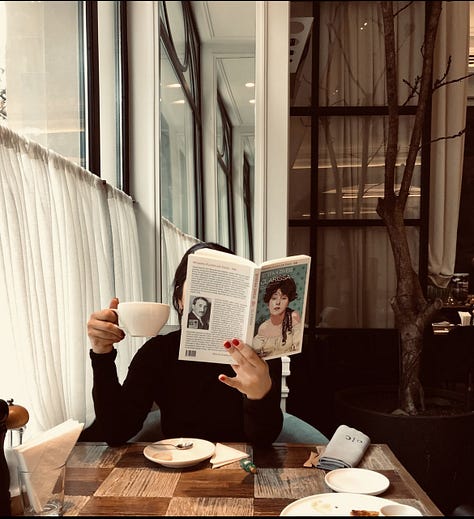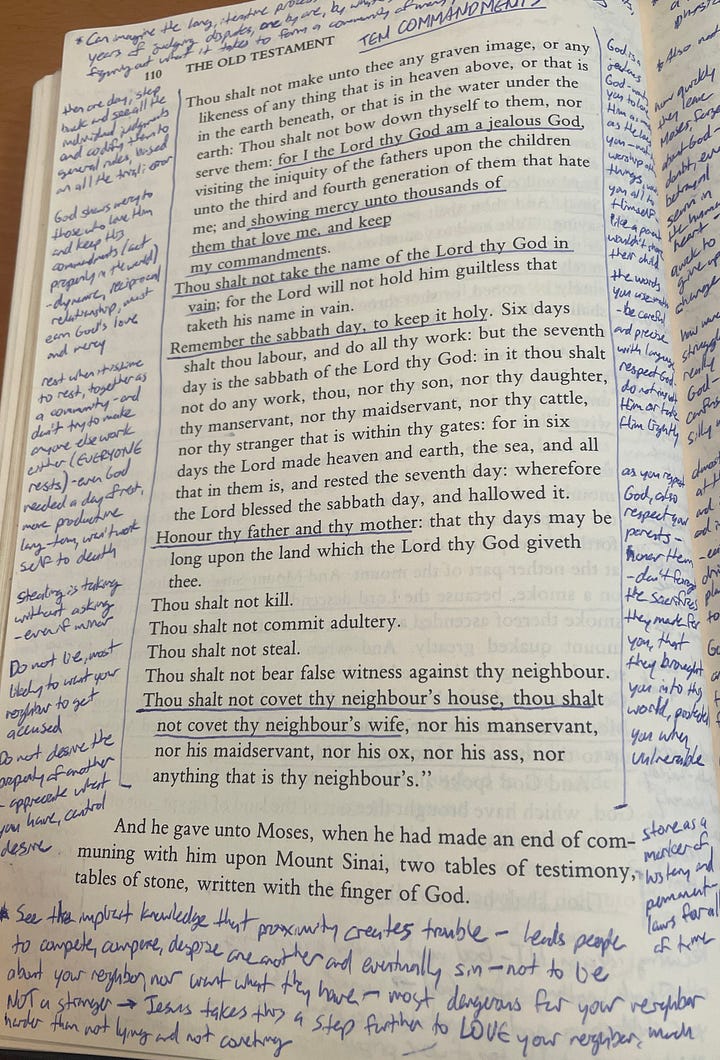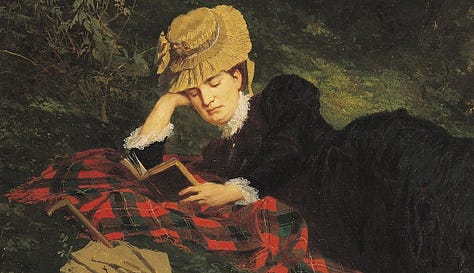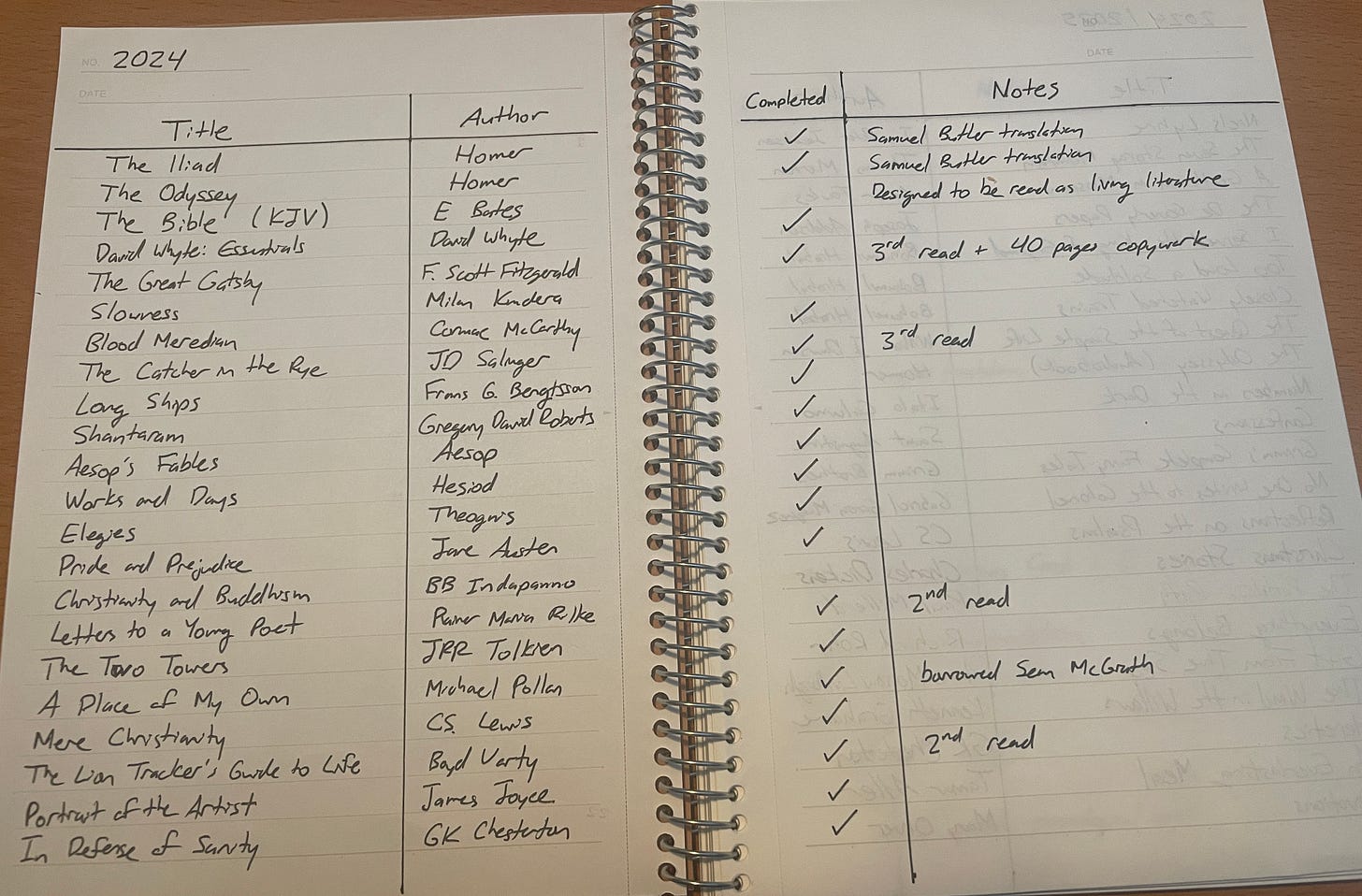I want to explain how I plan to educate myself over my lifetime through a structured reading plan. It will seem intense to most, crazy to many, but perhaps helpful to a few.
If I were on my deathbed at 90 years old, aside from getting married and raising a family, I'd be most disappointed to hear that I never got around to reading humanity's great books.
Reading has always been a natural love of mine1. I can sit in a chair and read for hours. My daily schedule begins and ends with reading, with blocks of reading during the day. I wake up at 5:00 AM to read for three hours while the house is still sleepy and subdued. I read after lunch. I read before dinner. I read myself to sleep. Although sometimes demanding or difficult, it's never taxing. I often close a book more energized and centered than when I opened it.
When I sit down to read in the morning with a hot cup of coffee, a few Pilot G2s, and a good book, it's pure joy. I wouldn't want to start my morning another way, even if it was my last on earth.
There's an addictive feeling of awe when absorbed in a good book. A feeling of being seen and heard. Reached out to, across the canyons of time and the cosmos of the human mind. It’s the intimacy of being understood.
Despite more stimulating media, the simplicity of paper and ink somehow offers a more refined and seductive experience. Text remains the loveliest medium.



My reading habit is driven by an intense longing to live well. To expand my mind, broaden my understanding of the world, enrich the act of living, and draw closer to the essence of what it means to be human. To develop a meaningful philosophy of life. To better serve others. It's a pursuit of genuine wisdom by becoming more deeply aware of the great and enduring truths of human life.
But, like getting married or sending a letter or buying land, anything truly romantic, there isn't a real rational explanation. I can't really explain why it's important to me, other than it is. It feels important.
I don't think you can receive this type of education at a university, at least not anymore. A true education unfolds over a lifetime. It must be taken into one's own hands.
Naturally, I’m in love with the romantic vision of being well-read. Erudite and eloquent. But I also love the actual reading. The effort.
Creating the reading plan
I think about challenging reading like exercise. A reading plan is like creating and committing to an exercise plan. Difficult and daunting at times, but actually quite pleasant in the swing of things, with a solid sense of accomplishment after each session. That’s what reading The Bible every morning feels like: a workout for my brain.
I’ve read hundreds of books over the past few years, including many great works of literature—Dumas and Dickens, Austen and Aesop, Homer and Hemmingway and Hrabal—but mostly in a haphazard manner.
My reading plan is a way of building some structure around my existing reading habit. It should help to simplify and focus what I read and lend a rigid reminder when I feel the tug to open email or YouTube and fritter away time.
It may be more fun to play it fast and loose. Read whatever I feel like, whenever I feel like it. But, paradoxically, true freedom cannot be found without discipline.



It's partly inspired by Ted Gioia's lifetime reading plan, still one of my favorite posts on Substack. While Ted has completed the majority of his lifetime reading, and can speak to the benefits, I am just setting out. Where he has the credibility of competence and the authority of achievement, I have the eyes of an amateur, still staring up at the giants whose shoulders I hope to stand on.
It's a lifetime plan. I have to remind myself that I have plenty of time. Things tend to work out for the patient and persistent. A lot of good work can be done in a year. Never mind a decade.
What did I read last year?
In 2024, I started 41 books and finished 31 of them. Some I'm still reading and others I abandoned. Life is too short to read something I am not enchanted by. There are simply too many other worthwhile works to read.
I record all the books I'm reading in a little notebook. It's a list I often use to recommend books or identify gaps in my knowledge to fill.
This past year was primarily devoted to reading The Bible. Very. Slowly.
I'll finish by the end of this month, a year from when I started.


Reflecting on my past year of reading, I had a few realizations:
I should be reading fewer books and spending more time contemplating what I do read. Great books aren't just meant to be read. They're meant to be studied. The challenge is to resist the lure of more, and instead let the very best ideas from the very best books color my worldview and prompt me to dream. A philosophy can only become an ethos with time.
I should be abandoning more books. I get stuck reading something I'm only mildly enjoying because I like to complete things.
I should be intentional about batching books to read around a great work. Find an author I love and read their three best books, then a biography, then listen to an interview, track down their old letters or forgotten short stories or esoteric poetry. Repetition is important.
My Lifetime Reading Plan
So... what books will I read?
Each year has a main topic or area of focus, almost like a university course. By simmering in one universe of ideas, I can compare perspectives to get a panoramic view on the topic, and let conflicting ideas compete with each other to come to my own conclusions. It won't always be exciting to stay on a single subject, but I think it’s necessary for deep and lasting understanding. Boredom is important. It's where a lot of great work gets done.
I will start with the greatest works of the past before moving to the present. I want to assimilate the tradition and absorb our heritage first. See how the roots of thought spread and branch across time; trace the intellectual fingerprints. Plus, the best way to understand the present is by understanding the past.
And I'm aiming for about 80% fiction. For reasons I won't get into here, I think a good life is sown with stories much more than facts.
Every month, I will have 300-400 pages of a main work to read (the most challenging books) early in the morning when I'm sharpest. And then two or three secondary books for lighter reading in the afternoons and evenings. I'll track progress by roughly knowing how many pages to read each day.
Year 1 (2024): The Bible
Religious or not, the stories in The Bible contain more depth, wisdom, and cultural significance than any book out there. Jesus was the most influential person to have ever lived2. Christianity transformed the modern world and every Westerner bathes in the water of Christian thought; water so pervasive we don't even realize it surrounds us. The Bible is the book that shaped the West. Even a basic understanding becomes a codex to unlock the meaning behind some of humanity's greatest creative work. If you go to the Louvre or listen to Bach or read Dickens without knowing the biblical stories, much is missed.
Year 2 (2025): Christianity
Several important works of Christian literature will help deepen my understanding of how this religion revolutionized the world. I'm planning to cover Augustine, Dante, Milton, Bunyan, Aquinas, Eckhart, Lewis, and more. I'll continue dipping into scripture daily, in the early mornings, but at a relaxed pace.
Year 3 (2026): Russian Literature
Tolstoy and Dostoevsky are arguably the two greatest novelists of all time, but there is a pantheon of other excellent Russian writers no one talks about, like Bulgakov, Nabokov, Gogol, Pushkin, Solzhenitsyn, and Chekhov. Russia has produced the best literature of the last 300 years.
Year 4 (2027): Shakespeare
Perhaps the greatest and most influential writer to have ever lived. I plan to read everything Shakespeare has written (38 plays plus his sonnets) chronologically.
Year 5 (2028): Proust
Proust's 2,000 page masterpiece In Search of Lost Time is a dense read, but regarded by many as the greatest work of literature ever. Six pages a day can't be that hard... right? Similar to Shakespeare, I'll read lots of secondary material to make more sense of Proust's genius.
Year 6 (2029): English & French Literature
There is such a wealth of excellent writing here that it'll be hard to fit everything in a year. From Dickens to Dumas, Conrad to Chaucer, Hardy and Hugo, Stoker and Stevenson, and Eliot and Austen and Woolf and Bronte.
Year 7 (2030): Ancient Greece & Rome
The beginning of history and the foundation of civilization. This will be a mix of epics, poetry, plays, philosophy, and history.
Epics: Homer, Virgil, Ovid.
Poetry: Horace, Lucretius.
Plays: Sophocles, Euripides, Aeschylus, Aristophanes.
Philosophy: Socrates, Plato, Aristotle, Cicero, Epicurus.
History: Herodotus, Thucydides, Xenophon, Plutarch, Tacitus, Livy.
Year 8 (2031): American Literature
It's painful to wait seven years to get to the American writers, but their work rests on the foundation of the past. Melville, Márquez (Columbian but must be included!), Morrison, Faulkner, Fitzgerald, Foster-Wallace, Hemmingway, Twain, Steinbeck, Kerouac.
You can see the whole reading plan in detail here.
As I'm seeking out challenging books, books far over my head, they will require effort and patience and some stubbornness to unpack and understand. I’ll be supplementing each with lecture series, summaries, author interviews, and other material to further comprehension3. With The Bible, I've listened to Jordan Peterson's Genesis lecture series, Tim Keller's Questioning Christianity lecture series, and watched videos from The Bible Project, as well as different discussions on Exodus and the Gospels. While reading, I would look up parts of scripture I couldn't grasp.
There are gaps, but I think it's a strong starting point in a lifetime of reading.
This plan will change, as any good plan does. But it’s better to have a fallible plan than no plan at all. I will probably be silly and sporadic and read random books. Maybe I'll fall in love with Norwegian literature or medieval romance and alter the schedule. I am leaving leeway to move things around based on the season or mood of my life.



This is also not about speed reading. To read well is a noble exercise. I read very slowly, almost languidly. Always with a pen in hand, leaving copious notes in the margins of books, and tend to read sentences two or three or four times until I’m sure I understand the idea the writer is developing. Great books, difficult books, must be savored and slowly digested; there is a kind of marinating I want to occur.
It can be frustrating to move at such a slow pace, but the frustration from finishing a book and realizing I glazed over everything is far greater.
Being well-read is not reading many books, but rather, reading well. The goal is not to read everything, but to find the 100 great books and read them over and over again.



Intense reading for two or three hours a day is unrealistic in the big outside world of demanding day jobs and adult responsibilities4. Reading, even for thirty solid minutes, may be impossible with a family. That's why I want to frontload most of the heavy lifting and deep learning before I'm 30.
It's certainly not for everyone. There are non-trivial costs to devoting so much time and energy to reading books, like having less space for stillness and empty space or just experiencing life itself.
But everyone, I’d argue, should think about how they can be more intentional with what they consume. And what kind of messages these mediums deliver.
A little discipline can provide a lot of freedom.
The cumulative impact of my reading plan, I hope, will be life-changing.
Happy reading,
If you want to help fund the reading plan, the best way is by becoming a patron:
Recently, I shared my bookshelf with patrons, a collection of general book recommendations.
Or, if you found this piece meaningful but are not ready to become a patron, you can Buy Me A Coffee.
When I look back, I began to write because of my love for reading. I was constantly consuming interesting ideas and wanted a way to synthesize my thoughts and share them. Writing is the only way one can make a career out of reading recklessly.
Like a friend said to me once, “If He was the Son of God that's crazy... but if He wasn't, that's even crazier.”
I’m a big fan of Ben McEvoy's Hardcore Literature book club. Ben creates lecture series on the great books. He’s an incredibly well-read, deep thinker who pulls in cross-disciplinary ideas, and a great lecturer. I always leave listening his lectures with a deeper love for literature. You can get a taste for his work on YouTube or Spotify if you search "Hardcore Literature Book Club".
Priorities are less what you do and more what you don’t do.
Books are my only inputs, aside from recreational Substack and Pinterest. I don’t listen to podcasts or use social media or watch television. I'm ignorant of current affairs, apart from what I absorb through osmosis from family and friends.






"A true education unfolds over a lifetime."
I love that line.
Life becomes our Teacher, i we are willing to let it.
"Religious or not, the stories in The Bible contain more depth, wisdom, and cultural significance than any book out there. Jesus was the most influential person to have ever lived2. Christianity transformed the modern world and every Westerner bathes in the water of Christian thought; water so pervasive we don't even realize it surrounds us"
💖💖